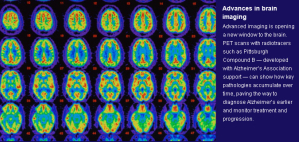Alzheimer's research may receive a record-setting increase in funding of $350 million within the $1.1 trillion spending deal Congress reached Tuesday night for fiscal 2016. If the overall budget is approved by the White House, it will increase government spending on the disease by more than 50 percent, reports The Washington Post.
Because Alzheimer's routinely is referenced as a "coming crisis," many people suggest it should be funded at the same level as cancer, HIV/AIDS and heart disease research.
A panel of scientists convened by the Alzheimer's Association estimated the National Institutes of Health would need $2 billion a year to maximize the chances of curing or preventing the disease by 2025.
Ronald Petersen, director of the Mayo Clinic Study of Aging and the Mayo Alzheimer's Research Center, said this level of funding is some of the most encouraging news regarding Alzheimer's disease in several years. If each year the funding is increased by $350 million, he noted, the $2 billion goal would be reached by 2020.
By 2025, the number of people age 65 and older with Alzheimer's is estimated to reach 7.1 million — a 40 percent increase from 5.1 million today, according to the Alzheimer's Association.
The anticipated increase in funding to investigate Alzheimer's is larger than last year's, when a $25 million increase was budgeted for its research. NIH funding for Alzheimer's was $586 million in fiscal 2015, compared with $3 billion for HIV/AIDS and $1.6 billion for heart disease.
Alzheimer's and other dementias are caused by the buildup of microscopic clumps of a protein fragment called beta-amyloid and twisted strands of a protein called tau, which clog the space between brain cells and impede the transmission of information from cell to cell. Scientists say a key part of the future lies in identifying predictors of Alzheimer's — through memory and thinking tests and MRI scans — before symptoms occur.

Currently, there are five FDA-approved Alzheimer's drugs that treat the symptoms of Alzheimer's, medications that temporarily help memory and thinking problems in about half of the people who take them. But these medications do not treat the underlying causes of Alzheimer's.
Without significant breakthroughs to cure or prevent the disease, the number of people expected to be affected by 2050 could rise to 13.8 million, with costs soaring to as much as $1.1 trillion a year in public and private spending.
Reaching the 2025 goal would save payers $220 billion over the first five years and $367 billion in 2050 alone. Savings to Medicare and Medicaid would account for nearly 60 percent of the savings, indicates a new Alzheimer's Association report.







